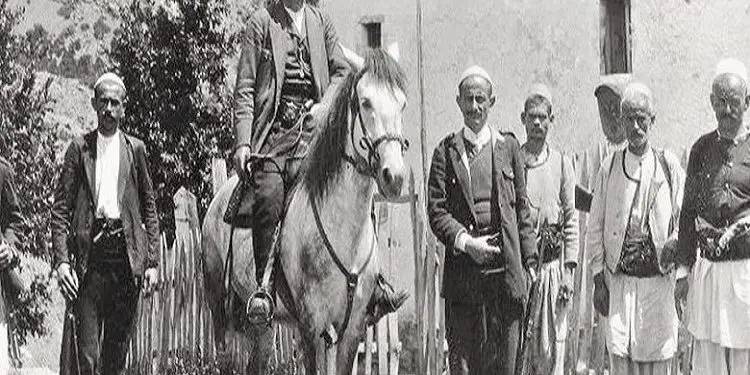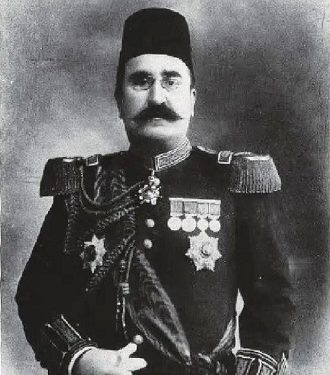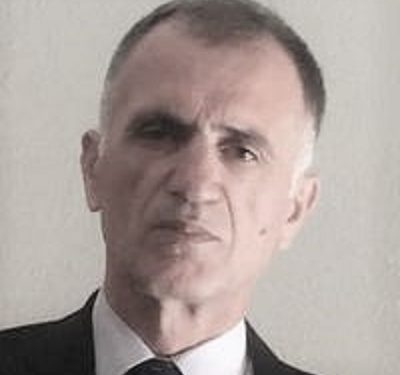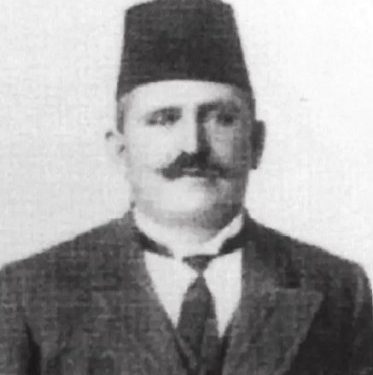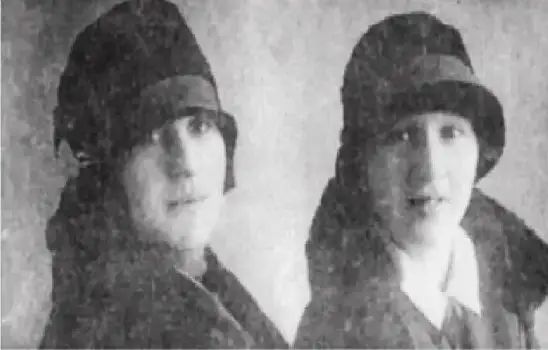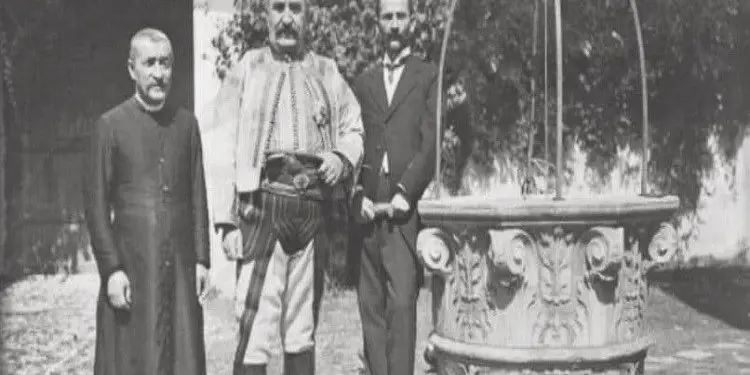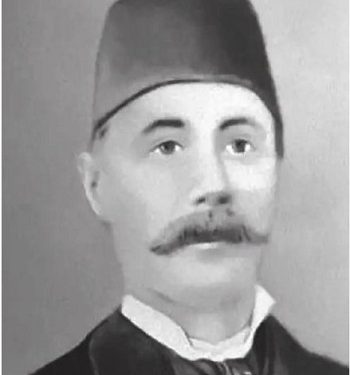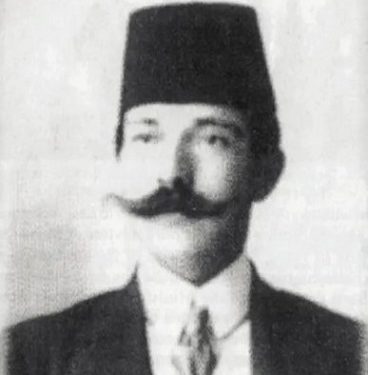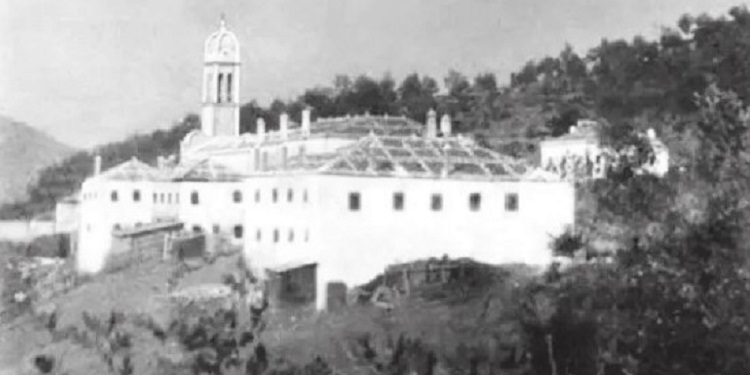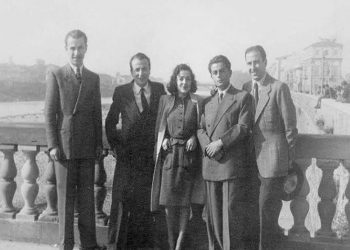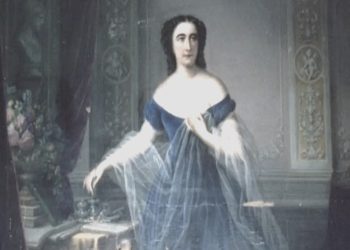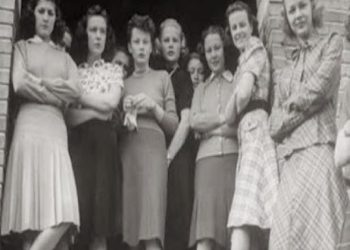By Dr. Nikol Loka
The seventh part
“PRENGA BIBE DODA, THE SHADOWS OF A CITIZENSHIP”
Memorie.al / The newest book “Prengë Bibë Doda, a phenomenon in Albanian political life”, by the researcher Nikollë Loka, not only expands the field of historical studies on Mirdita, the Door of Gjonmarkaj and the figure of the Mirdita Prince, Prengë Bibë Doda, but it is also a contribution to national historiography. The very rich archival material, the literature used or consulted, oral traditions, etc., make this book a real study treasure, giving the science of history a scientific monograph that enriches our knowledge of Mirdita, its captains, tradition, history etc. To study such an important and complex figure, as the figure of Prengë Biba Doda, is a high scientific responsibility that not everyone undertakes. Nikollë Loka, has done a great job of research and treatment by the professional researcher, giving us the portrait of the Prince and the general Mirditor, with the true contours. Loka has adhered to the end of space and time, in which the multidimensional events and their protagonists have unfolded.
THE MONOGRAPH “ABOUT BIBË DODA, A PHENOMENON IN ALBANIAN POLITICAL LIFE”, A VALUABLE SCIENTIFIC STUDY THAT ENRICHS THE FUND OF OUR HISTORICAL STUDIES
(By Mr. Sc. Murat Ajvazi, March 2017, Switzerland)
Continues from last issue
Gjonmarkajt, as the defender of Catholicism in Mirdita and beyond, the Captain of Mirdita, was born after the agreement of the Mirditas at the High Gate. An important point of the agreement was that “the people of Mirdita keep their faith”. It was religion that well identified the Mirditas, as people not subject to prominent individuality. Of course, there were Catholics in the other highlands as well, but they were forced to accept a lower social status compared to their Muslim compatriots: they did not have the right to bear arms, they could not serve in the Ottoman army, they had to pay taxes and others.
The Muslim girls, married to the Kapidans, have converted to Christianity, the exception was Margjela herself, of Biba Doda, a Muslim who accepted her husband’s religion. Of course, in the district of Gjonmarkaj, they could not be accepted with any other faith, except the Catholic one. In conditions where religion became an important basis of autonomy, it could not simply be a matter of individual conscience, nor of different social groups. It became an inherent feature of life in freedom.
This collective relationship of the Mirditas with Catholicism is given beautifully by Dom Ndoc Nikaj:
“In the entire Ottoman Empire, the religion of the state was Muhammadism, in Mirdita, the religion of the country was Catholicism. In the Ottoman King, any faith was allowed, but in Mirdita, no other faith was allowed, that of Catholic Christians, which Mirdita had. Everywhere a person, a Catholic Christian, became a Muhammadan, without any disturbance, but in Mirdita, it was strictly forbidden to convert to the Muhammadan faith, and in such a case, the assembly of the chiefs was convened, under the chairmanship of the Kapidani, and that man or that family was definitely shot from the border of Mirdita, their property was looted, their plants and trees were cut down, their land was left fallow, for pasture in the village. This was the greatest sign of sovereignty, of the Capidan of Mirdita”. (102)
So Gjonmarkaj had complete sovereignty, like the defenders of Catholicism in Mirdita, and they did not receive orders or interference from anyone. Mirdita, had to remain completely Catholic. Neither the decrees of the Sultan nor the orders of the Vali could in any way harm the religious life, it made them have the support of the neighboring population, with Mirdita, who looked with sympathy on this Province. The Mirditas, despite having preserved Christianity, were not discriminated against and did not pay any type of tax. The privileges of Mirdita were viewed with sympathy by the Catholic territories bordering it, but also by the Catholic Clergy of these territories, who wanted their population to have the protection that was reserved for Mirdita. Quite naturally, the populations of the Catholic Bajraks, neighboring Mirdita, the five Bajraks of Kapidan. This is how Mirdita was formed, twelve Bajraks.
This process continued even further. We have a certain tendency of Zadrima, to rely on Mirdita. Next, in the field of fees, this support was guaranteed, since the Mirditas with the Kapidans could not accept the persecution of Catholics, regardless of where they lived. Faverial, tells us about a girl from Zadrima, who converted to Catholicism and wanted to marry a boy of this religion. After the problems that accompanied the couple who went to Prizren, the Mirditors, led by Biba Doda, took up arms. Fortunately, the troops arriving in a hurry from Manastir arrived before the Mirditors, otherwise the war would have broken out! (103)
But Mirdita’s influence was not limited to the neighboring provinces. Thus, in a confusion that occurred between Gashi of Krasniqe, who was a Muslim, and Bobi of Shala, a Catholic, the Shalajans turned for help to Dodë Prenga of Mirdita, whose intervention avoided the reprisals that Mustafa Pasha Bushati intended to did against the Shalians. With Mirdita, the more Catholic highlanders felt safer, therefore the process of approaching them was more natural. Thus, the heads of the Bajraks of Puka and Lura, signed a petition addressed to the Congress of Berlin, for their union with Mirdita. (104) Even later, on November 28, 1914, the primacy of the mountains of Dukagjin and Mirdita, gather together and declare that; they recognize Prengë Bibi Doda as their leader. (105)
Canon as defender of “constitutionality”, among Gjonmarkaj
According to the Canon, all the men of Gjonmarkaj were called Kapidana and were respected by the people as such. But, for the problems of the country, the management of affairs was done by the Chief, the one to whom the pariah belonged. But how was pariah defined among Gjonmarkaj? The Pariah of Mirdita belonged to the first son of the first brother. On this basis, the ruling captains behind Gjonmark were: Marka Kolë Gjoka, Gjon Marku, Llesh Gjoni (he did not exercise this function because he died before Gjon Mark, killed in the battle with Begollaj in Fane in 1772) , Wool Cuffs, Doda Cuffs, Bibê Doda, Bibê Doda Cuffs. Here, the branch of Prengë Lleshi, was left without descendants and then the pariah passed to the branch of Llesh Lleshi (Black Wool), who was the second brother. From this branch, Marka Gjoni and John Marka Gjoni ruled.
During these two hundred years, it happened that the ruling Kapidans were absent, or they were old and then others also ruled, but in all cases, they were the viceroys of the ruling Kapidans. Thus, after the death of Dodë Prengë Lleshi, in 1828, at the door of Gjonmarkaj, a fight broke out over the inheritance of the rule. Biba, to whom the inheritance belonged, was small. Under these conditions, the Governor of Shkodra appointed as ruler, Biba’s uncle, Nikollë Prengë Lleshi, who would take care of the governance of the country, based on the Canon, until Biba became a man. (106)
But the most numerous problems were encountered during the rule of Prenga Biba Doda, in the years 1868-1919. He spent 37 years of his life in exile in Istanbul and during this period, Mirdita was governed by other captains appointed by the Ottoman authorities, but who were never accepted by the people of Mirdita as the first. The people had nothing to do with the other Kapidans, some of whom had made great contributions, but the problem lay in respecting the right of the priest, which was clearly defined in the Canon. If this point of the Kanun was violated, at a later stage, the Ottoman authorities would have been better off replacing these captains appointed by it, with other people.
In February 1869, the assembly of 12 Bajraks was gathered in Shpal, in which it was unanimously decided that; Bibë Doda’s son, Prenga, was recognized as the ruler of Mirdita, having Gjon e Mark Lleshi as his guardian. (107) The government did not accept and appointed Gjon e Mar Lleshi as kajmekam. But Gjoni was not accepted by the Mirditas and was forced to leave. Then the High Gate appointed Marka Gjok Doda as kaymekam, but the Mirditas did not accept him either. Kola Prenga, Prengë Kola, and Marka Gjoni also sat in the post of Kapidani-kajmekam, but even they were not accepted by the people.
After failing to appoint a kaymekam from Dera e Gjonmarkaj, the Ottoman authorities decided to appoint Muslim kaymekams, who did not even dare to come to Mirdita, but stayed in Shkodër, or went all the way to Mjedë, where they pretended to rule the province, under the defense of the Turkish army. The Muslim kajmekams were mainly Albanians, such as Hajdar Agë Belegu from Kruja, Reshit Bey Bushati from Shkodra, Dervish Bey from Prizren, Mahmut Aga from Podgorica, Jusuf Sokoli from Shkodra, and others.
Efforts to preserve the right of marriage for Prenga Biba Doda continued without interruption. Even the General Assembly gathered in Shpal, on December 3, 1873, sent a protest to the consuls of the European states, in which, among other things, they demanded the destruction of kajmekamluk and the preservation of traditional autonomy. On April 5, 1876, the leaders of Mirdita met with Valiu Hamdi Pasha and asked him for the return of Biba Doda’s son and his appointment as head of Mirdita. (108) When they saw that the peaceful demands were not being taken into account, the Mirditas switched to warlike actions. The Mirdita uprising of 1903 demanded the return of Prengë Biba Doda.
PRIVATE CAPTAINS OF PARIE
In Dera Kapidanore, all the boys were called Kapidana, but only one of them had the right to lead Mirdita: the first son of the first brother. Based on this canonical rule, which was actually applicable until some time ago to other peoples, such as the Spanish, the Belgians, the Swedes, and others, this line of inheritance could only be interrupted if the first brother, there were no descendants. Then, the right of marriage passed to the first son of the second brother, as actually happened to Gjonmarkaj. So, from all those captains, some of whom were distinguished and well-known men, for their bravery and intelligence, some should be singled out, those who were entitled to the right of pariah. Here below, we will present a brief biography of these Kapidans, with copyright:
- Marka Kolë Gjoka
Marku is mentioned in historical sources during the Austro-Turkish war, of 1737-1739, with the function of Head of Oroshi and commander of Mirdita’s armies, in that war. For the Mirditas’ services against the Turks, in those battles, Sultan Mahmut I gave them the title “Kapidan”. From that time back, the Mirditas accepted the pinjales of this door, to lead them to war, and that door was known as the “Door of the Captains”. So Marka Kolë Gjoka, is the founder of Mirdita’s Captain’s Door, a ruling door for two hundred years in a row.
- Gjon Marku
Kapidan Mark’s son, Gjoni, led Mirdita at a time when feudal debauchery had begun and the Albanian pashalars were trying to expand their dominions, at each other’s expense. John was a fearless and lucky warrior. He gained enough fame, from the wars against the Turks, that all the small tyrants, who ruled at that time in different parts of Albania, sought his support, which they paid a high price for. In this way, he gained honors and benefits. It was under the guidance of this leader that Albania began to recognize the name of Oroshi, the village where he had placed his residence.
Without mentioning the exploits of this warrior, the songs tell that he carried out successful military campaigns all over Albania, sometimes in the service of the Pasha of Shkodra, sometimes in the service of the governors of Peja, Prizren and Gjakova, etc. One of them confesses that sent with his troops to the interior of Rumelia, he destroyed the agents of the provinces around Edernea. (109) At that time, Mirdita was part of the Sanjak of Dukagjin, which depended on the Begollaj of Peja. In order to serve the Begollans, Kapidan Gjoni, in 1769, went to help Tahir Bey and Hysen Bey in Zadrima, who had risen up against the Bushatllinjas of Shkodra and fought to separate Zadrima from the Bushatllinjas and put it back under the rule of Begollais. He went to help Hysen Bey, with many people from Mirdita and the surrounding villages…”! (110)
Five years later, in 1774, the Vizier of Shkodra, Mehmet Pashë Bushati, asked Gjon Mark for an alliance with Mirditas, taking it upon himself to recognize their previous privileges, on the condition that they send soldiers to the Pasha’s service. The men’s assembly, gathered in Shpal in the spring of 1774, established the connection of Mirdita with the Bushatlli of Shkodra. In 1775, Karamahmut, the son of Mehmet Pasha the Elder, continued the conflict that his father had started, with Ahmet Kurt Pasha of Berat. With Karamahmut’s army, two thousand mirditas went, under the command of John Mark. The battle took place on September 12, 1775, near Peqin. The armies of the Pasha of Shkodra were defeated. Gjon Marku was also killed there with 60 mirditas, after a strong resistance, which made it possible to withdraw the Pasha of Shkodra alive. (111) John died on the walls of Peqin, which he had taken by assault. The people of Mirdita do not know where their graves are. Captain Gjoni made Mirdita an important factor. During his rule, he separated the bajrak of Fan from the Begollais and oriented Mirdita, in an alliance with the Bushatlli.
- Prengë Lleshi
John Mark left three sons. One of them died without leaving an heir, the other had a son from whom the branch of Prengë Markola descends. As for the eldest son, his name was Llesh Gjoni. He participated in many battles and was killed in a battle. (112)
He died, without taking the lead of Mirdita. He was killed in 1772, in Fana, in the war against the forces of the Begollaj of Peja. Llesh Gjoni, left three sons: Prenga, Doda and Llesh. The little boy, who took his name, apparently when he was killed, was a burden in the womb, and according to custom, should take his father’s name. Mirdita’s primacy was inherited by the eldest son, Prengë Lleshi.
Prengë Lleshi joined Mahmut Pasha of Shkodra, who accompanied him in the Black Mountain campaign, when this Pasha was killed. Prenga was put at the service of all the pashalars of Albania, to whom he gave troops of warriors, commanded by his brothers or sons, troops that, since then, have been evaluated as the best and most loyal. (113) The fame of Prengë Lleshi, the victories that his weapons reaped, made for themselves the fearful mountaineers of Dibra and Mati, who, together with the Mirditors, fought under the orders of his family members, throughout Rumelia, supported and paid, by independent and very rich bachelors. (114)
In 1795, Karamahmut Pasha conquered Prizren, to unite it with his pashalak. In this action, he relied mainly on the Mirditas fighters, commanded by Kapidan Prengë Lleshi. The claim to include Montenegro under his Pashallak, encouraged Karamahmut to attack him in the summer of 1796. In the battle of August 11 of that year, the Mirditas showed their loyalty to Bushatli, ensuring the withdrawal of the army of Pasha and saving him himself, from falling into the hands of the Montenegrins. Kapidan Prenga won a lot of recognition and rewards on this occasion. Despite the defeat, in the autumn of the same year, Karamahmut Pasha, at the head of 20 thousand forces, repeated the campaign against Montenegro.
In the composition of his army, there were also 6 thousand mirditas, commanded by Prengë Lleshi. Even in these battles, the endurance of the Mirditas, which was unmatched. Kapidan Prengë Lleshi helped the Bushatllinjes in all military campaigns and relations between the Kapidan and the Vizier were very friendly. But the relations between them were interrupted in 1806, when the Mirditas, according to the established tradition, joined the army of Ibrahim Pasha, against the Serbian insurgents. Here Ibrahim Pasha betrayed the leader of Mirdita’s army, Kolë Marka Gjoka. After this serious act, Prengë Lleshi became an enemy of the Bushatllinjes and outlined a new alliance, with Ali Pasha Tepelena, who held three tabors of the Mirditas, in his personal guard. (115)
Kapidan Prenga sent to the aid of Ali Pasha Tepelena, together with his eldest son Doda, a selected troop of mirditors, which he later reinforced with fifty men, commanded by his brother, Lleshi i Zi. As a reward for these services, Ali Pasha covered him with honors and riches and allowed the Mirditas to practice their faith freely. In 1810, the Captain of Mirdita, Prengë Lleshi, left his son, Doda, in Janina, as a sign of loyalty to Ali Pasha. (116)
The Captaincy of Mirdita and the Pashallek of Shkodra spent about 8 years in enmity with each other. During this time, Prengë Lleshi, continued the incursions on Zadrima, leveling everything that belonged to the Turks, without ever being defeated and managing to return to the mountains, without suffering losses, even when it came to the army, much bigger than my own.
At the beginning of 1810, Ibrahim Pasha’s courtiers, remembering that Mustafa Bey supported his own people and that he tried to expel all the others, joined the exiles, Xheladin Bey and Abdulla Aga, all of them with the same words, invited them to Tophane, against Mustafa Bey, divided Shkodra into two parties and occupied the bazaar, as far as Qafa, as it was done. With their words, Prengë Lleshi, together with Sulejman Aga, the governor of Lezha, occupied all the places of Zadrima. Finding himself in such a strait and almost surrounded, only with the help of the trays, and a few brave mountaineers, Mustafa Bey, who was proclaimed Pasha by the High Gate, with the help of a Tartar, who brought him signals from Istanbul.
In the war against the Bushatllians, Captain Prengë had the support of the Begollais of Peja, who also depended on the Sanjak of Dukagjin. In 1810, at the end of May, while the Head of the Mirditas, he arrived at Ura e Spasi, to bring Numan Pasha of Begollaj to Zadrima. In that situation, the Vizier of Shkodra mobilized numerous forces to first destroy Mirdita’s forces, before Peja’s army arrived. The captain, upon hearing the affairs of Zadrima, with all his soldiers, fled from Spasi to Zadrima and settled in Narac. Tahir Bey, after defeating the guards of Vau of Bushati with money, entered Shkjeza. The corrupt guards, when they heard that Prenga came to Zadrima, ashamed of their corruption, made their last efforts to recapture that place, but in vain, because they had been expelled, leaving most of them killed and wounded. (117)
Kapidan Prenga is forced with only 300 men to fight with the army of Shkodra and Mbishkodra. In that unequal battle with the supporters of Mustafa Pasha, Prenga is wounded and his brother, Doda, is killed. In that situation, unable to maintain his positions, the Head of Mirdita retreats to Mirdita. (118)
The enmity continued with Mustafa Pasha, who, to the anger of Prengë Lleshi, captured many mirditas, who were pilgrims with mules in the market of Shkodra. Then Prenga arrested Shkodra merchants who were returning from the Struga bazaar and with his forces of 500 Macedonians, fell through Zadrima and plundered Mjeda. To solve the problem, Mustafa Pasha and Prengë Lleshi were forced to accept mediation, but the talks ended without any better results, except for the release of the hostages. At the instigation of the exiled courtiers of Ibrahim Pasha, at the beginning of the summer of 1815, the fortress was conquered by the mountaineers of Lezha.
The indomitable Prengë, although some of his own had rebelled and joined Mustafa Pasha, went to Troshan, with a select, armed detachment, expecting another tragedy for the castle of Shkodra, just as the covenant had been. But since the Shkodra covenanters could not implement their attempt, Mustafa Pasha sent the army to Zadrima. Troshan was looted and Jak Kabashi was killed in the monastery, while Prengë Lleshi was followed, who retreated to his country, he stopped at the top of Krestë mountain, above Troshan and Kallmet, and waited for the people from Mbshkodra, and with a fight harshly, showed them who they were fighting. Many residents of Mbshkodra were left dead and many injured. He only had two people left.
In the efforts to reconcile Captain Gjomarkaj with the Bushatllinjes, Ali Pashë Tepelena was the mediator. It was decided that each party would send three representatives to Ioannina. (119) In 1815, Prengë Lleshi and Mustafa Pashë Bushati made a truce. In order to maintain his friendship with Ali Pasha Tepelena, Prenga did not go to Shkodër himself, but took his son, Doda.
The peace between the first two doors of Gegeria was accompanied by the passing of the Dibri bajrak from Bushatllinj to Gjonmarkaj. At this time, the four-bajrakish Mirdita becomes a five-bajrak. After the truce, on November 25, 1815, by means of a letter, Mustafa Pashë Bushati confirmed Gjon Mark’s house as: “the first house of all Mirdita, as the previous Viziers had known it”. After the reconciliation, Prengë Lleshi fell ill. The wound he received in the war of 1810, with the Bushatllians, caused health problems, so he went to Kototrr for treatment, but at the end of November, he passed on to the next life. (120)/Memorie.al
The next issue follows
- Ndoc Nikaj, Memories of a past life…, p.25
- Jean Claude Faverial, History (oldest) of Albania, “Plejad” publications, Tirana 2004, p. 433
- Kristo Frashëri, The Albanian League of Prizren, 1878-1881, Tirana 1989, p.124
- AQSH, “Prengë Bibë Doda” Fund, File 2, f.1
- Zef Marka Harapi, Mirdita in history and gojdhana until 1929, Hylli i Drita, No. 1, year 1931, p. 6
- AQH, P.24, File 54/1 Cf
- Duke Dekaz, Minister of Foreign Affairs of France addressed to Kolona Cekald, Consul of France in Shkodër, Versailles April 5, 1876, Albania in the years of the League of Prizren, volume I
- Hyacinthe Hecquart, History and description of Upper Albania or Gegëria,… p.222
- Stavri Naçi, Pashalleku i Shkodra, Tirana 1964, p.94
- Stavri Naçi, Pashalleku i Shkodra, Tirana 1964, p.94
- Hyacinthe Hecquart, History and description of Upper Albania or Gegëria,… p. 223
- Hyacinthe Hecquart, History and description of Upper Albania or Gegëria,… p. 223
- Hyacinthe Hecquart, History and description of Upper Albania or Gegëria,… p.223-224
- Hylli i Drita, year VII, No. 3, year 1931, Chronicles of Shkodra, p. 113
- Kahreman Ulqini, Bajraku in the old social organization… p. 54
- Part from the chronicle of Dajçi of Zadrima, see Hylli i Drita, No. 3, year 1931, p. 109 – 113.
- Stavri Naçi, Paschalek of Shkodra… p.94
- Part from the chronicle of Dajçi of Zadrima, see Hylli i Drita, No. 5, year 1931, p. 304-305.




